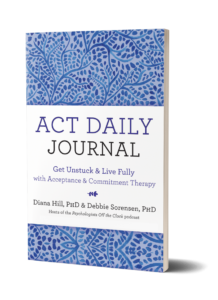I first came across Acceptance and Commitment Therapy (ACT) while at graduate school, over 15 years ago.
I remember the day vividly. I was invited to a small seminar led by Kelly Wilson, one of the co-founders of ACT.
At first I felt confused and overwhelmed by the terms and concepts he described that laid out the 6 Core Processes of psychological flexibility. But once Kelly shared the heartbreaking details of his struggles with addiction, loss, and health and how ACT helped him through those difficult times, I knew that this was a style of therapy I could get behind.
The fact is, we all struggle – and ACT can help, no matter who you are or what challenges you’re facing. ACT is an approach that embraces acceptance, vulnerability, and humanity without leaving behind science, behaviorism, and action toward change.
ACT doesn’t assume that people are broken, or that problems are there to be ‘solved’ — but rather, as Kelly would put it, that problems are “sunsets to be appreciated.” It’s often our struggles that teach us the most in life.
As an evidence-based therapy, ACT’s processes and techniques have been rigorously studied and are demonstrated to be highly effective. But what sets ACT apart from other evidence-based approaches is that it is a model of flourishing for every individual; not just those of us who may be struggling with a mental health condition.
I am interested in bringing ACT from the research studies, ivory towers, and therapy rooms into your life, so that you can flourish every day.
Acceptance and Commitment Therapy is:
Evidence-based
- Thousands of research studies on ACT and contextual psychology show its powerful potential for change
- Over 400 randomized controlled trials have demonstrated its effectiveness
- Equivalent to the gold-standard (CBT) in its impact on depression and anxiety
Integrative
- Incorporates cognitive behavioral methods, contemplative wisdom, evolution science, compassion-focused approaches, interpersonal theory, and therapist/client wisdom
Transdiagnostic
- Demonstrated effective across diagnoses
- Provides a model of optimal human functioning
- Effective for mental health problems and mental health optimization
A Fresh Way to Approach Old Patterns
- Eschews unhelpful approaches that avoid pain and suppress thoughts
- Offers a new approach to old habits that help you get unstuck and start living more fully
The 6 Core Processes of ACT can feel complex and overwhelming when you are first learning them, but if you take a stance of learning from your heart — not your head — you probably will find that they tap into a ‘knowing’ you already have.
The 6 Core Processes of ACT are:
- Be Present
- Practice Acceptance
- Know Your Values
- Take Perspective on Self-Stories
- Step Back from your Thoughts
- Take Committed Action toward what and who you care about
When practiced together, these processes build your psychological flexibility and resilience. Being psychologically flexible helps with so many parts of our lives, from being an effective parent, to sticking with healthy habits, to thriving at work. When you are psychologically flexible, you can freely choose to pursue what matters most to you, even in the face of difficult thoughts, emotions and sensations.
It’s been over a decade since I was first captivated by ACT, but it feels as vibrant as ever. Much like a hermit crab that takes on new shells as it grows over time, I have evolved in my practice of ACT. Value-rich living now informs not only my clinical work, but also my daily life as a parent, friend, partner, and fellow traveler.
To learn more about the benefits of ACT, take a peek at this short video.
If you’re looking to learn more about harnessing the power of ACT, check out my new book, ACT Daily Journal: Get Unstuck and Live Fully with Acceptance and Commitment Therapy, which unpacks the 6 Core Processes of ACT, and offers practical ways to incorporate these processes into your daily routine through journaling.


+ show Comments
- Hide Comments
add a comment